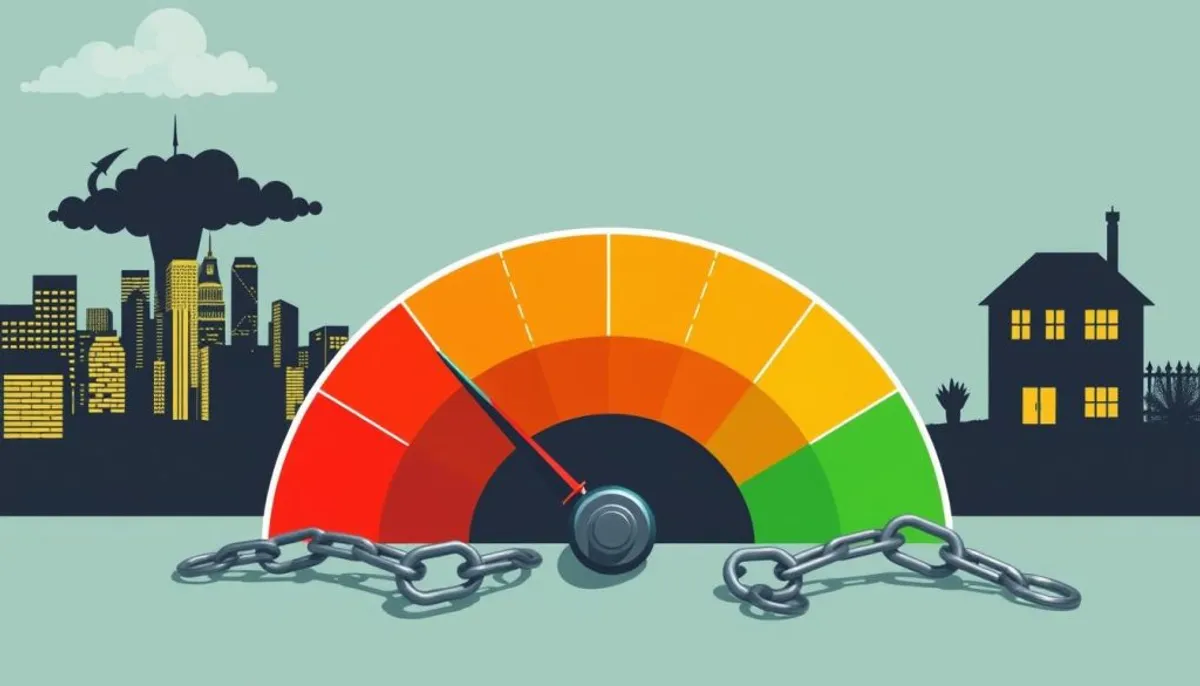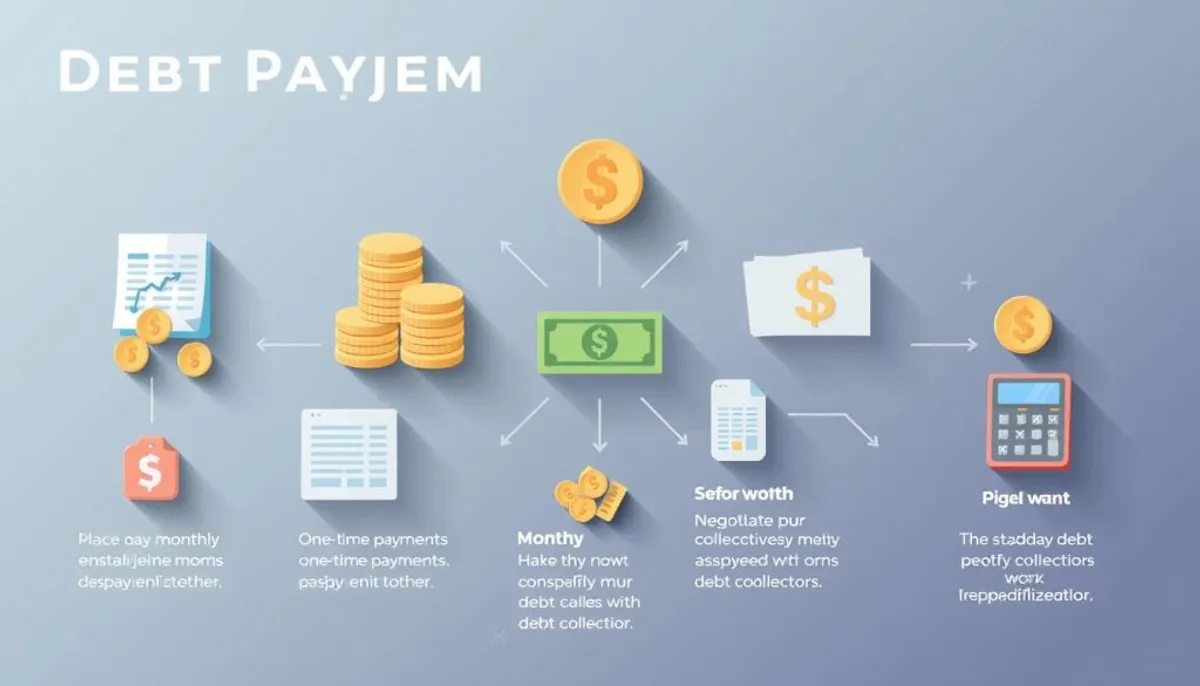Engaging with ARS debt collector can be a source of significant stress. This agency is dedicated to collecting unpaid bills from consumers. If you’ve encountered calls or letters from ARS Collections, remain calm. Familiarizing yourself with your consumer rights is essential for navigating this challenging situation.
ARS Collections operates as a legitimate debt collection agency. They acquire overdue accounts from creditors who have lost interest in pursuing payment. Their methods, though sometimes aggressive, are governed by legal protections. It is imperative to confirm any debt they claim you owe.

Having a collections account on your credit report can negatively impact your score. This may limit your access to loans or credit cards. Yet, you possess the power to effectively manage your interactions with ARS Collections. This proactive approach can safeguard your financial well-being.
Key Takeaways
- ARS Collections is a legitimate debt collection agency
- Verify any debt before making payments
- Know your rights under the Fair Debt Collection Practices Act
- Collections accounts can impact your credit score for up to 7 years
- Consider seeking help from a credit repair service
- Document all communications with ARS Collections
- You can dispute inaccurate information on your credit report
Understanding ARS Debt Collector and Their Operations
ARS National Services, established in 1987, stands as a leading figure in the realm of account recovery services. Situated in Escondido, California, this debt collection agency extends its reach across all 50 states. It manages a diverse array of delinquent accounts.
Who is ARS Collections and Their Business Model
ARS Collections excels in accounts receivable management, dedicated to recovering outstanding debts on behalf of creditors. Their methodology prioritizes quality and adherence to legal standards, ensuring professional and empathetic interactions with debtors. The company rewards its employees with competitive compensation and performance-based bonuses, complemented by a suite of comprehensive benefits.
Types of Debts ARS Collections Handles
ARS Collections oversees a broad spectrum of delinquent accounts, encompassing:
- Credit card debts
- Personal loans
- Student loans
How ARS Collections Acquires Debts
ARS Collections procures debts from a multitude of creditors, frequently through the purchase of unpaid accounts. Subsequently, they employ debt collection practices to reclaim these funds. It is crucial for consumers to be aware that they possess a 30-day window post-initial contact to request debt validation in writing from ARS National Services.
| ARS Collections Facts | Details |
|---|---|
| Founded | 1987 |
| Headquarters | Escondido, California |
| Operating Area | All 50 U.S. states |
| Working Hours | 8 a.m. to 9 p.m. (as per FDCPA) |
| Employee Benefits | Medical, dental, vision insurance, paid time off |
Your Legal Rights When Dealing with ARS Debt Collector
Understanding your rights is paramount when ARS engages in debt collection. Federal laws safeguard you from exploitative practices. We will examine the essential protections afforded by these statutes.
Fair Debt Collection Practices Act (FDCPA) Protections
The FDCPA imposes stringent regulations on debt collectors, including ARS. It prohibits tactics such as harassment, making false statements, and engaging in unfair practices. For instance, ARS cannot contact you at inconvenient times or disclose your debt status without consent. Violations of these provisions can be reported to the Consumer Financial Protection Bureau.
Fair Credit Reporting Act (FCRA) Guidelines
The FCRA dictates the handling of your credit information. It ensures your right to dispute any inaccuracies on your credit report. If ARS inaccurately reports your debt, you can initiate a dispute. The credit agencies must then investigate and rectify any errors within a 30-day timeframe.
State-Specific Collection Laws
Each state has its own set of debt collection laws, offering additional protections beyond federal mandates. These laws may restrict the timeframe for debt collection lawsuits or impose stricter guidelines on collection activities. Familiarizing yourself with your state’s laws is crucial to fully understand your rights when confronted with ARS.
| Law | Key Protections |
|---|---|
| FDCPA | Bans harassment, limits contact hours, requires debt validation |
| FCRA | Allows credit report disputes, mandates timely error corrections |
| State Laws | May set lower interest rates, shorter statutes of limitations |
Being aware of these laws empowers you to assert your rights. If ARS infringes upon any of these protections, you have the authority to take action. This ensures your protection against unfair debt collection practices.
Impact of ARS Collections on Your Credit Score

ARS Collections can have a profound effect on your credit score. When a debt is sent to collections, it indicates a history of financial difficulties or missed payments. This negative mark can significantly alter your payment history, a critical component in determining your credit score.
Collections accounts, managed by entities such as ARS, can remain on your credit report for up to seven years. Throughout this period, they continue to influence your credit score. A U.S. PIRG study revealed that 79% of credit reports contain inaccuracies, underscoring the need for vigilant credit monitoring.
Here’s how ARS Collections can impact your credit:
- Lower credit score
- Difficulty obtaining new credit
- Higher interest rates on loans
- Potential issues with employment or housing applications
Addressing collection accounts promptly is essential. While ARS National Services generally does not accept goodwill letters for removing collection records, there are alternatives. You can dispute any inaccuracies directly with ARS or the credit bureaus. Before settling any debt, it’s advisable to consult a credit repair expert to mitigate potential damage to your credit score.
It’s important to remember that the Fair Debt Collection Practices Act (FDCPA) and Fair Credit Reporting Act (FCRA) offer protections for consumers facing debt collectors like ARS. Familiarizing yourself with these rights can aid in effectively navigating the credit reporting landscape.
Validating Your Debt with ARS Collections
Dealing with ARS Collections necessitates debt validation. This process is vital for confirming the debt’s authenticity and safeguarding against credit report inaccuracies. Understanding this step is crucial.
How to Request Debt Verification
To initiate the debt verification process, compose a written request to ARS Collections. Include your account number and request comprehensive details about the debt. This communication should be dispatched within 30 days of their initial outreach. Retain a copy for your records.
Timeline for Debt Validation Response
ARS Collections is obligated to furnish a debt validation letter within 5 days of their initial contact. Upon receipt of your request, they must provide the requisite documentation. During this interval, all collection activities must cease.
Analyzing Debt Validation Documents
Examine the documents ARS Collections supplies with meticulous attention. Verify the presence of:
- Original creditor’s name
- Debt amount
- Account number
- Date of last payment
Should discrepancies arise, address them immediately. Given that 79% of credit reports contain errors, meticulous verification is paramount.
| Action | Timeframe |
|---|---|
| Initial debt validation letter | Within 5 days of first contact |
| Consumer’s request for verification | Within 30 days of receiving initial letter |
| ARS Collections’ response | Prompt response required |
Negotiation Strategies for Debt Settlement
Effective debt negotiation is crucial when dealing with collectors like ARS National. A well-planned approach can lead to favorable settlement offers and improve your financial planning.
Preparing for Negotiation Conversations
Before engaging in debt negotiations, gather all relevant information about your financial situation. Determine a realistic amount you can afford to pay, either as a lump sum or in installments. Be ready to explain your financial hardship clearly.
Settlement Offer Guidelines
When making settlement offers, aim for 60% or less of the total debt. For junk debt buyers, settlements of 10-35% are typical, while original creditors may accept 50-75%. Remember, debt settled for less than owed is reported as “Settled in Full” on credit reports.
Documentation Requirements
Always get settlement offers in writing before making payments. Follow payment instructions precisely to avoid defaulting. Keep records of all communications and agreements throughout the debt negotiation process.
| Settlement Type | Typical Percentage | Credit Report Impact |
|---|---|---|
| Junk Debt Buyers | 10-35% | Visible for 7 years |
| Original Creditors | 50-75% | Visible for 7 years |
| Recommended Offer | 60% or less | Reported as “Settled in Full” |
Consider seeking help from an IAPDA-certified debt settlement specialist who understands fair debt collection practices. They can guide you through the negotiation process and help achieve the best possible outcome for your financial situation.
Payment Options and Plans Available
ARS Collections provides diverse debt repayment solutions to facilitate your journey towards financial stability. They accept various payment methods, including checks, e-checks, and major credit cards such as Visa, Mastercard, American Express, and Discover. This broad range of options empowers you to select the most suitable payment method for your financial circumstances.
Establishing payment plans is a simple process. Simply contact ARS representatives at 601-355-5211 to explore your options. While online scheduling is available, it’s important to note that post-dating is not an option. ARS ensures that your payment progress is accurately reported to creditors every 30 days after the end of the month.

When selecting a payment plan, it’s essential to align it with your budget. Below is a comparison of common payment options:
| Payment Option | Description | Best For |
|---|---|---|
| Lump-sum settlement | One-time payment for a reduced total amount | Those with available funds seeking quick resolution |
| Short-term plan | Higher payments over a shorter period | Individuals able to make larger payments for faster debt clearance |
| Long-term installments | Lower monthly payments over an extended period | Those needing more time and lower payments for manageable debt repayment |
Ensure that all payment terms are documented in writing before committing to any plan. This agreement should detail the total amount, payment schedule, and any potential penalties for missed payments. By selecting the appropriate payment plan, you can effectively manage your debt and achieve financial recovery.
Using ti3 Platform to Manage Overdue Accounts
The ti3 platform presents a contemporary approach to managing unpaid accounts. It simplifies the collection process, facilitating businesses in retrieving funds efficiently.
Benefits of Automated Payment Reminders
Automated reminders are a pivotal aspect of ti3. They empower businesses to manage overdue accounts effortlessly, eliminating the need for manual intervention. This feature sends timely alerts to clients, enhancing the likelihood of timely payments.
Streamlining Collection Processes
Ti3 revolutionizes debt collection by automating key functions. It tracks payment statuses, schedules follow-ups, and manages client communication. This automation not only saves time but also minimizes errors in the collection process.
Maintaining Client Relationships
Client retention is paramount for business success. Ti3 ensures that positive relationships are maintained, even when dealing with overdue accounts. Its professional debt collection approach keeps clients content while ensuring timely payments.
| Feature | Benefit |
|---|---|
| Automated Reminders | Increased on-time payments |
| Streamlined Processes | Time and cost savings |
| Professional Communication | Improved client retention |
By integrating ti3 into their operations, businesses can adeptly manage overdue accounts while safeguarding client relationships. This cutting-edge platform combines automated reminders, streamlined processes, and professional communication to bolster debt collection efforts.
Stopping Unwanted Collection Calls and Communications
Dealing with debt collector harassment can be stressful. The Fair Debt Collection Practices Act (FDCPA) protects you from abusive practices. Here’s how to stop unwanted calls and communications from ARS Collections.
First, know your rights. FDCPA guidelines limit when collectors can contact you. They can’t call before 8 AM or after 9 PM. They’re also restricted to seven calls per week about a specific debt.
To stop communications, send a written request to ARS Collections. This doesn’t erase your debt, but it can provide relief from persistent contact. Be aware that ARS may still inform you about legal actions.
- Request in writing to cease all communication
- Keep a copy of your letter for your records
- Send via certified mail with return receipt
If ARS violates your request, you can file a complaint with the Consumer Financial Protection Bureau. In 2022, the CFPB received about 115,900 complaints about debt collection.
| Communication Method | How to Opt-Out |
|---|---|
| Phone Calls | Written request to stop |
| Emails | Use unsubscribe option |
| Text Messages | Reply “STOP” or opt-out link |
Remember, setting clear communication preferences can help manage debt-related stress. If ARS continues to harass you, consider seeking legal advice to protect your rights under the FDCPA.
Steps to Remove ARS Collections from Credit Report
Removing ARS Collections from your credit report is a daunting task, yet achievable. Credit report disputes and credit repair strategies are essential for rectifying your credit history. Let’s dissect the pivotal steps to address this challenge.
Dispute Process Overview
The dispute process is fundamental in credit repair for ARS Collections. Begin by obtaining a copy of your credit report and scrutinizing it meticulously. The Public Interest Research Group (PIRG) reveals that 79% of credit reports contain errors. If you identify inaccuracies linked to ARS Collections, initiate a dispute with both the collection agency and the credit bureaus.
Documentation Requirements
Accurate documentation is crucial for effective debt validation and credit report disputes. Compile all pertinent documents, including:
- Original creditor information
- Payment records
- Correspondence with ARS Collections
- Proof of any errors or discrepancies
Following Up with Credit Bureaus
After submitting your dispute, monitor the timeline closely. Credit bureaus generally have 30 days to investigate and respond. If no response is received within this timeframe, it is imperative to follow up promptly. ARS Collections may update the balance to $0 and alter the status to “Paid Collection” upon payment. Yet, the entry can persist on your report for up to 7 years from the initial delinquency date.
| Action | Timeline | Outcome |
|---|---|---|
| File Dispute | Day 1 | Dispute Received |
| Investigation Period | 30 Days | Bureau Investigates |
| Follow-up | Day 31+ | If No Response Received |
Conclusion
Dealing with ARS debt collectors can be daunting, but with the right knowledge, you can manage the process effectively. It’s essential to understand your rights under the Fair Debt Collection Practices Act. This act protects consumers from unfair practices, as evidenced by recent court decisions against collection agencies.
When faced with collection attempts, prioritize validating the debt and explore various resolution options. Whether through negotiation or setting up a payment plan, the focus should be on your financial recovery. Remember, resolving debts is a crucial step towards improving your credit. The ti3 platform can be a valuable resource for managing overdue accounts and maintaining positive client relationships.
Despite ARS’s criticism, with an average rating of 1 star and reports of unfulfilled commitments, each situation should be approached individually. By staying informed and proactive, you can achieve successful debt resolution. This paves the way for long-term financial stability.
RelatedRelated articles



